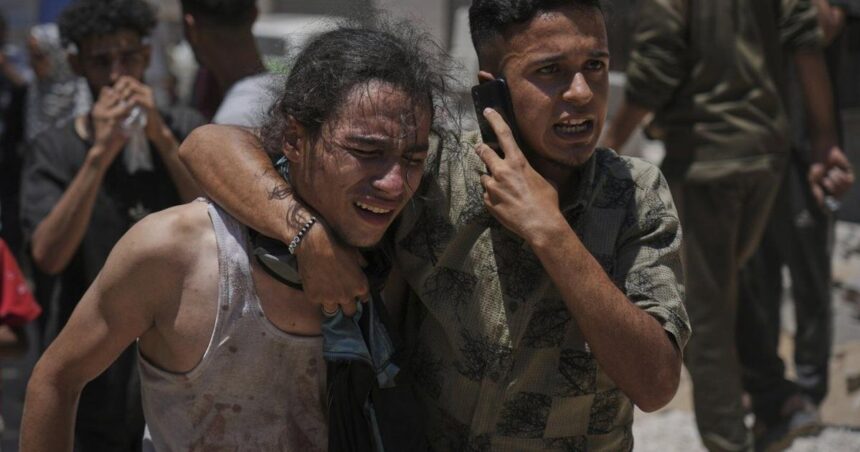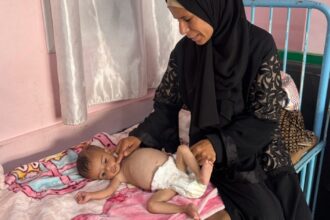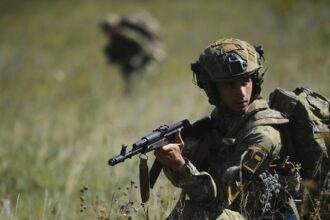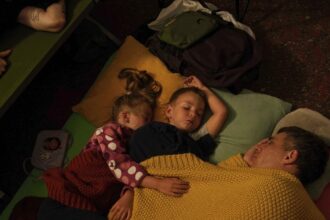The early morning darkness still shrouded Gaza City when desperate Palestinians began gathering Thursday around aid trucks, hoping to secure flour and other essential supplies for their families. What followed instead was a cascade of bullets, blood, and chaos that would mark one of the deadliest single incidents in the four-month Israel-Hamas war.
At least 80 Palestinians were killed and over 260 wounded when Israeli forces opened fire on crowds surrounding an aid convoy in northern Gaza, according to health officials in the Hamas-run territory. The massacre unfolded at the Kuwait Roundabout, a key intersection where starving residents had assembled after hearing rumors of incoming humanitarian assistance.
“We were just trying to get food for our children,” said Ahmed al-Najjar, 43, who survived the incident with shrapnel wounds. “They opened fire without warning. People were falling everywhere around me.”
The Israeli military offered a starkly different account, claiming their troops fired only after feeling threatened by what they described as a “violent mob” that had surrounded the convoy. Defense officials stated that most casualties resulted from a stampede and people being run over by aid trucks, though this assertion contradicts eyewitness accounts and hospital reports documenting gunshot wounds.
This tragedy underscores the catastrophic humanitarian situation in Gaza, where the United Nations has warned of imminent famine. An estimated 2.3 million Palestinians have been displaced during the conflict, with many now subsisting on one meal per day or less. Critical infrastructure including hospitals, water treatment facilities, and food distribution networks have been decimated by Israeli bombardment.
“What we witnessed today represents a complete breakdown of humanitarian principles,” said UN Secretary-General António Guterres, who called for an immediate independent investigation. “Civilians seeking life-saving assistance must never become targets.”
The incident has sparked international outrage and renewed calls for a ceasefire. President Biden described the deaths as “tragic and alarming,” while Canadian Prime Minister Justin Trudeau called for “full accountability” for the killings. Even Israel’s staunchest allies have expressed concern about the deteriorating humanitarian conditions and mounting civilian casualties.
“The systematic obstruction of aid delivery constitutes collective punishment,” said Francesca Albanese, UN Special Rapporteur on the Occupied Palestinian Territories. She noted that hunger is being weaponized in violation of international humanitarian law.
The death toll in Gaza has now surpassed 30,000, according to the Palestinian Health Ministry, with women and children comprising a significant percentage of the casualties. Meanwhile, approximately 100 Israeli hostages remain in captivity following Hamas’ October 7 attack, which killed about 1,200 people and triggered the current conflict.
For Palestinians in Gaza, Thursday’s massacre represents yet another trauma in an unending nightmare. Hospitals, already struggling with shortages of medical supplies, power, and clean water, were overwhelmed with casualties. Surgeons performed operations on floors as beds ran out.
“I’ve lost my brother and two cousins today,” said Mahmoud Saleh, 35, while waiting outside Al-Shifa Hospital. “They were just trying to get flour. Is food now a crime punishable by death?”
As night fell over Gaza, families buried their dead in hasty graves, adding more names to the growing list of casualties in a war with no end in sight. The question now facing the international community is stark: How many more must die before the fundamental right to food, water, and safety is guaranteed for Gaza’s trapped civilian population?
























